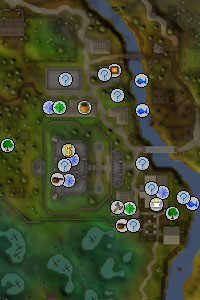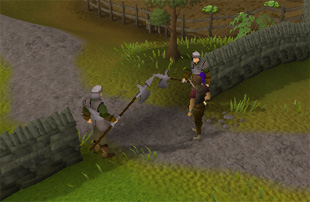Beginners' Guide
Exploring Lumbridge | Navigating RuneScape | Starting Areas | Warnings
Quests | Skills | Other Players
Quests | Skills | Other Players
Exploring Lumbridge

During Unstable Foundations, you should become relatively familiar with how to play RuneScape, but it's a good idea to get your bearings in Lumbridge before heading off into the wider lands.

Be sure to talk to Roddeck if you have questions that need answering. You can call on him at any time with one click of the advisor button (represented by a question mark), situated next to your minimap, or on the top-right corner of your objectives side interface (which is represented by a signpost icon). Click here to find out more about advisors.
You can also visit the shops in Lumbridge to receive free items - a taster of what the shops have for sale. There is a limit to the number of times you can receive these free items in a short period, but they are useful for replacing the odd fishing rod or pickaxe that has been lost.
Navigating RuneScape
RuneScape is a massive world, and it's pretty easy to get lost if you're new. To help you find your way around, you'll probably find the world map a useful tool. Simply click on the globe in the top-right of the game screen to open a map centred on your location. You can read more about the world map by clicking here.
Some important locations also feature signposts. You can use these to find out what cities or towns are nearby, along with some basic directions to get there. To read a signpost, simply click on it.
Starting Area

A similar warning will be given to any lower-level player who enters a dungeon that leads out of the starting area.
Warnings

Quests
There are different levels of quests in RuneScape - Novice, Intermediate, Experienced and Master.
To start you off, there are a selection of quests you can do in and around Lumbridge. We recommend the following:
- Cook's Assistant
Start by speaking to the cook in the kitchen of Lumbridge Castle, which is on the ground floor. - The Restless Ghost
Start by speaking to the priest in the church opposite Lumbridge Castle. - Rune Mysteries
Start by speaking to the Duke in Lumbridge Castle on the first floor.
For a list of all of the novice quests available in RuneScape please see the Novice Quest listings.
To show you where the quests begin, you can right-click any quest in the list and select 'Show on the world map'. This will load the world map and centre it on the quest start, so you can quickly determine where you need to go. You can also right-click on a quest and set it as an objective.
Skills
When you first arrive in Lumbridge you may find that you need to obtain various items before you can start training your skills. To get yourself used to the skills used in RuneScape we recommend that you start by training the following skills:
Woodcutting
 Once you get to Lumbridge you can immediately start to train this skill because the only item you'll require is a Woodcutting hatchet, which you can get for free from Bob's Axes, in the southern end of Lumbridge. This skill is useful because it enables you to obtain a ready supply of logs that you can burn to cook food, or fletch into bows and arrows. For more information on this skill please see our Woodcutting Guide.
Once you get to Lumbridge you can immediately start to train this skill because the only item you'll require is a Woodcutting hatchet, which you can get for free from Bob's Axes, in the southern end of Lumbridge. This skill is useful because it enables you to obtain a ready supply of logs that you can burn to cook food, or fletch into bows and arrows. For more information on this skill please see our Woodcutting Guide.
Firemaking
 This is one of the easiest skills to start training. All you need is a tinderbox and some logs. You can also get a tinderbox for free from the general store, just north of Lumbridge Castle. Firemaking is useful for cooking meat or fish when you are not near a Cooking range. For more information on this skill please see our Firemaking Guide.
This is one of the easiest skills to start training. All you need is a tinderbox and some logs. You can also get a tinderbox for free from the general store, just north of Lumbridge Castle. Firemaking is useful for cooking meat or fish when you are not near a Cooking range. For more information on this skill please see our Firemaking Guide.
Cooking
 In RuneScape, food heals you when you eat it, so Cooking is a useful skill to provide yourself with food to heal those lost life points. The chicken pen to the north-west of the general store in Lumbridge will provide you with raw meat to start building this skill. For more information about the Cooking skill please see the Cooking Guide.
In RuneScape, food heals you when you eat it, so Cooking is a useful skill to provide yourself with food to heal those lost life points. The chicken pen to the north-west of the general store in Lumbridge will provide you with raw meat to start building this skill. For more information about the Cooking skill please see the Cooking Guide.
Fishing
 This skill gives you a method of obtaining food other than by killing an animal and cooking its meat. It is an essential skill throughout the game, as fish can be caught in most waterways and along much of the coastline. You can get free fishing tools from the fishing store in Lumbridge, north of Lumbridge Castle. For more information on this skill please see our Fishing Guide.
This skill gives you a method of obtaining food other than by killing an animal and cooking its meat. It is an essential skill throughout the game, as fish can be caught in most waterways and along much of the coastline. You can get free fishing tools from the fishing store in Lumbridge, north of Lumbridge Castle. For more information on this skill please see our Fishing Guide.
Mining and Smithing
 Mining allows you to extract different materials from certain rocks. You can smelt these ores into bars and smith the bars into useful items. For a beginner, these two skills can be useful because from a low level you can make useful items to help you in battle. It's a good idea to make some armour to protect yourself against attacks when building up your combat skills. See the Mining Guide or the Smithing Guide for further information on these skills.
Mining allows you to extract different materials from certain rocks. You can smelt these ores into bars and smith the bars into useful items. For a beginner, these two skills can be useful because from a low level you can make useful items to help you in battle. It's a good idea to make some armour to protect yourself against attacks when building up your combat skills. See the Mining Guide or the Smithing Guide for further information on these skills.
Dungeoneering
 Visiting the halls of Daemonheim can be a great way to introduce yourself to the skills and combat of RuneScape. It is here that people arrive to raid dungeons by themselves or in parties in an attempt to gain spoils and experience. By starting at complexity level 1 and working your way up to complexity level 6, you can enjoy a shallow learning curve that slowly introduces you to the various skills of RuneScape. Training your Dungeoneering is also safe, so you don't have to worry about dying and losing your hard-fought items.
Visiting the halls of Daemonheim can be a great way to introduce yourself to the skills and combat of RuneScape. It is here that people arrive to raid dungeons by themselves or in parties in an attempt to gain spoils and experience. By starting at complexity level 1 and working your way up to complexity level 6, you can enjoy a shallow learning curve that slowly introduces you to the various skills of RuneScape. Training your Dungeoneering is also safe, so you don't have to worry about dying and losing your hard-fought items.
Combat
For more information about all the skills available to train in RuneScape please see the Skills section of the Manual.
Other Players

More articles in
Miscellaneous Guides
|
|
|
Further Help
Need more help? Come chat with us!
|
|

